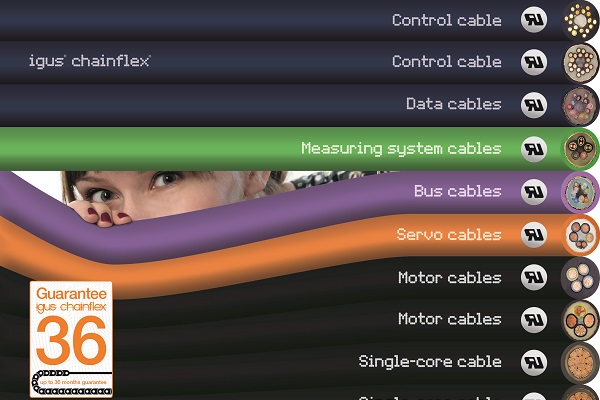igus is the world’s first manufacturer to receive UL approval for halogen-free TPE cables
The long service life of igus chainflex high-end TPE cables from Treotham convinces inspectors and gives customers certified security.
As the world’s first manufacturer, igus has received UL AWM certification from the well-known US organisation Underwriters Laboratories (UL) for its high-end TPE cables that do not use fire-retardant halogens as additives. This is the first time that the testing organisation has recognised that halogen-free TPE cables can also meet the fire protection requirements in industry.
ADVERTISEMENT
The independent organisation Underwriters Laboratories (UL) is one of the most important authorities in the USA in terms of product safety. It has been testing components of machines and systems since 1894 to see whether they are suitable for industrial use. Their seal is one of the prerequisites for a successful market entry in North America. Fire protection is a key decisive criteria.
This is because, according to the US National Fire Protection Association (NFPA), machine fires are the fourth leading cause of fires in industrial environments in the USA, closely followed by fires caused by electrical factors.
“That is why we are particularly pleased that igus has now become the world’s first manufacturer to receive a UL seal for halogen-free TPE cables,” igus vice president and head of the chainflex cable business Rainer Rössel says.
“The approval demonstrates to our customers that they have the safety aspect with chainflex high-end TPE cables.”
For this certification, the igus engineers had to do a lot of persuading. Up to now, the flame retardancy of cables has been the key factor in obtaining UL certification for fire protection. Approval is therefore only granted to products containing flame retardants such as chlorine, fluorine or bromine.
These additives increase the flame retardancy. However, so far it has not been considered that the flame retardants generally change the chemical structure of the jacket and reduce the mechanical load-bearing capacity.
Therefore, igus starts much earlier in the process: The cable specialist focuses less on preventing a fire from spreading, but rather on how the cable itself caused the fire. The TPE jacket compounds are extremely resistant to mechanical loads as well as external influences. They can therefore be used in a wide range of applications: in small installation spaces of up to 4xd, on highly dynamic, short travels with accelerations of 100m/s² or on long travels in a temperature range from -35°C to +100°C.
-
ADVERTISEMENT
-
ADVERTISEMENT


